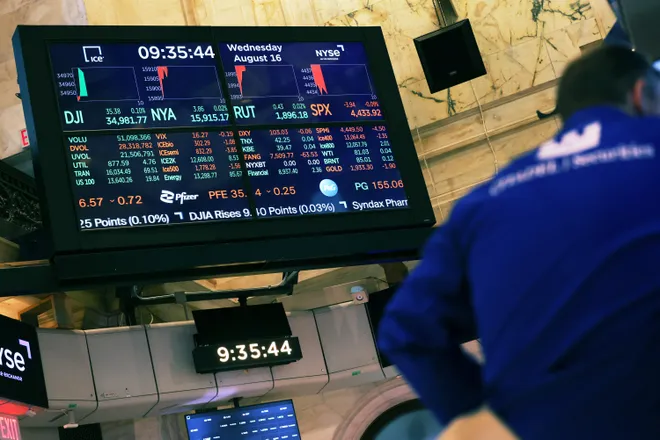S&P 500 slips Monday following Wall Street's worst week in a month
NEW YORK — Wall Street swung to a mixed finish Monday, continuing a monthslong run where it's followed the cue of the bond market.
The S&P 500 slipped 7.12 points, or 0.2%, to 4,217.04, coming off its worst week in a month. The Dow Jones Industrial Average dropped 190.87, or 0.6%, to 32,836.41. The Nasdaq composite rose 34.52, or 0.3%, to 13,018.33.
Rapidly rising yields in the bond market have been pressuring stock prices since the summer, and they seemed set to climb further. Early Monday, the yield on the 10-year Treasury briefly topped 5.02% to touch its highest level since 2007. That helped to torpedo stocks, and the S&P 500 quickly slumped 0.8%.
But the 10-year yield eventually eased back to 4.84%, down from with 4.91% late Friday, as oil prices tumbled to take some pressure off inflation. That relaxed the vise on the stock market.

Easier bond yields tend to most help stocks of companies promising big growth far in the future or those seen as the most expensive. That gave a particular boost to technology and other high-growth stocks.
A 3.8% jump for Nvidia and 0.8% rise for Microsoft were the two strongest forces pushing upward on the S&P 500. They helped limit the market's losses, when the majority of stocks on Wall Street weakened.
As the centerpiece of the global financial system, Treasury yields help dictate how much investors pay for everything from stocks to corporate bonds to cryptocurrencies. Higher yields also make it more expensive for nearly everyone to borrow money, which puts the brakes on economic growth and adds stress to the entire financial system.
“If bond yields continue to rise relentlessly, something will eventually break,” said Seema Shah, chief global strategist of Principal Asset Management. They already helped cause three high-profile failures of U.S. banks earlier this year.
Why is the 10-year Treasury yield climbing?
The 10-year Treasury yield has been mostly climbing for a few reasons, and it’s been catching up to the overnight interest rate that the Federal Reserve has hiked furiously since early last year to try to get inflation under control. The Fed has already pulled its main rate above 5.25%, its highest level since 2001, and has pledged to keep rates high until it’s sure inflation is heading back down to its target.
One wild card for inflation has been the price of oil, which has been shaky in recent weeks amid worries about the latest Hamas-Israel war.
What is the price of oil today?
A barrel of benchmark U.S. crude oil tumbled $2.59 to settle at $85.49. Brent crude, the international standard, fell $2.33 to $89.83 per barrel.
U.S. oil had been above $93 last month, and it's bounced up and down since then amid concerns that fighting in the Gaza Strip could lead to disruptions in supplies from Iran or other big oil-producing countries.
Gold's price, meanwhile, eased after jumping last week on worries about the war. An ounce slipped $6.60 to $1,987.80 as investors felt less need to herd into investments considered safer.
Chevron to buy Hess
Energy giant Chevron is putting some of its strength to work by buying rival Hess. Chevron said it’s swallowing up Hess in an all-stock deal valued at $53 billion. Chevron fell 3.7%, and Hess slipped 1.1%.
Chevron buys Hess Corporation for $53B:Another acquisition in oil, gas industry
It’s the second huge deal in the oil-and-gas industry in as many weeks. Exxon Mobil said earlier this month that it’s buying Pioneer Natural Resources in an all-stock deal valued at $59.5 billion.
Apple rose 0.1% after recovering earlier losses, following reports that Foxconn Technology, its Taiwan-based supplier, was recently subjected to searches by Chinese tax authorities.
S&P 500 companies report better-than-expected summer profits
While worries about higher Treasury yields and the war in Gaza weigh on markets, support also remains from strength for corporate profits and the overall U.S. economy.
The majority of companies in the S&P 500 have been reporting better profits for the summer than analysts expected, as is usually the case. It's still early days for the reporting season, but the pace picks up this week when more than 30% of the companies in the S&P 500 will report. They include General Motors, Microsoft and Amazon.
Given the breadth of companies reporting, including some Big Tech stocks that are among Wall Street's most influential, this week could offer a better picture about how corporate America generally is faring. The earliest reports this earnings season were dominated by banks.
Economic updates this week
Economic updates this week will include a Friday report on how much U.S. households are spending and what kind of inflation they're feeling. Strong spending by U.S. consumers has been one of the main reasons the economy has avoided a recession, but it's also threatening to keep upward pressure on inflation.
In stock markets abroad, indexes were mixed in Europe after falling sharply in much of Asia.
AP Writers Zimo Zhong and Matt Ott contributed.
Disclaimer: The copyright of this article belongs to the original author. Reposting this article is solely for the purpose of information dissemination and does not constitute any investment advice. If there is any infringement, please contact us immediately. We will make corrections or deletions as necessary. Thank you.







